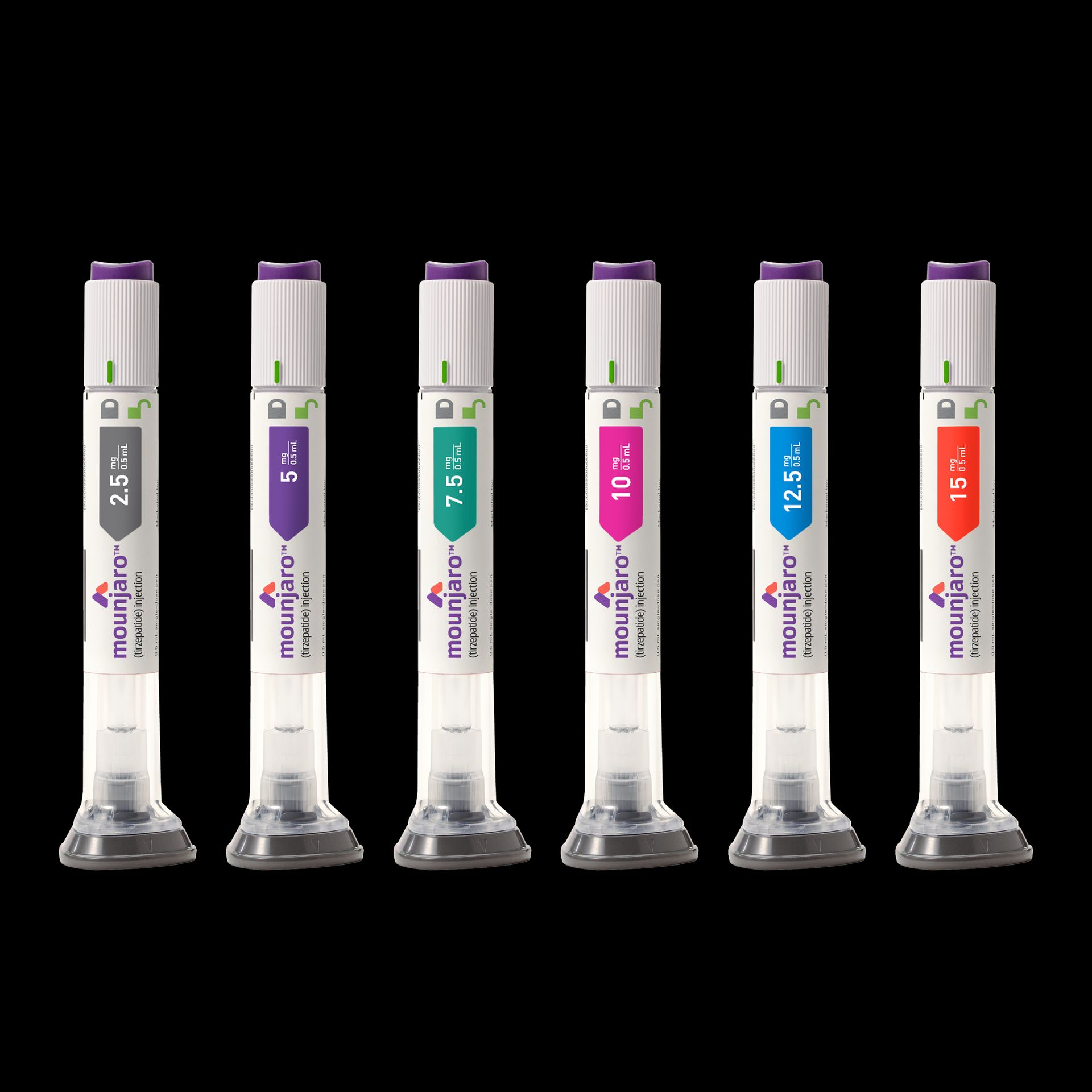Orforglipron GLP-1 Pill:
The Future of Weight Loss Treatments?

Orforglipron GLP-1 Pill: The Future of Weight Loss Treatments?
Orforglipron, currently under development, could become one of the first GLP-1 pills approved for weight loss. How does it differ from existing treatments, and what does this mean for the future of weight loss medications?
For years, the solution to obesity was always simple: “Eat less and move more.”
Until GLP-1 weight loss treatments like Mounjaro, Wegovy, and Saxenda have transformed the lives of patients who have long struggled with their weight, enabling them to lose up to 20% of their initial body weight.
Building on the success of these injections, manufacturers are now turning their attention to the next frontier of weight loss treatments: oral GLP-1 pills. And at the forefront of this development is a drug called orforglipron.
So, what could the arrival of orforglipron mean for the future of weight and obesity management?
This article explores orforglipron and how it differs from current weight loss treatments. We also explore how the oral pill might reshape obesity management in the years ahead.
What is Orforglipron?
Orforglipron is a once-daily oral pill currently in development for weight management and treating type-2 diabetes.
Eli Lilly, the manufacturer of the weight loss injection Mounjaro, expects that orforglipron will be available by early 2026. However, a specific release date has not yet been established.
Orforglipron is a medication in the class of drugs known as glucagon-like peptide-1 (GLP-1) receptor agonists.
GLP-1 receptor agonists, including weight loss injections such as Mounjaro, Saxenda, and Wegovy, are available in the UK.
In contrast to injectable GLP-1 medications, Orforglipron is part of a novel class of substances called “small-molecule, nonpeptide compounds.” This distinctive formulation allows the body to absorb and use Orforglipron upon oral administration efficiently.
How Orforglipron Works
Like Mounjaro, Ozempic and Wegovy, orforglipron is a GLP-1 receptor agonist.
GLP-1 agonists mimic the effect of GLP-1, a hormone your stomach releases when you eat food. This slows digestion, delays stomach emptying, and suppresses your appetite, which helps you lose and manage weight.
These treatments were developed to target type 2 diabetes. They assist the body in producing insulin while regulating blood sugar levels.
Orforglipron works slightly differently to GLP-1 injections. The medication has a non-peptide structure, which provides the same effects as weight loss pens when swallowed.
Injectable GLP-1 treatments, like Mounjaro and Wegovy, possess a peptide-like structure. They consist of large, complex compounds that the stomach's acid and enzymes could damage (how the body breaks down food). These compounds are too large to pass through the stomach wall, making them unsuitable for oral consumption (i.e., swallowing).
However, the new non-peptide compounds of orforglipron are smaller and more resilient. The stomach will not destroy them, allowing them to pass through the stomach’s wall. This enables oral administration while still producing similar effects to other GLP-1s.
Orforglipron vs. GLP-1 Injections
Although injections such as Wegovy and Mounjaro are known to be highly effective, they may not be the most convenient option for all. Many believe orforglipron, a daily oral pill, will serve as a more “patient-friendly” alternative to GLP-1 injections.
But how does Orforglipron compare to traditional GLP-1 injections? And is it the more convenient option? “A patient taking tablets instead of injectables will likely have fewer concerns about how to use the medication.”
Is Orforglipron More “Patient-Friendly"?
Many people find pills easier to take and less intrusive than injections. Research has found that patients often “preferred to avoid injectable medications in part due to embarrassment and inconvenience.”
Discretion is also essential for patients. Unfortunately, both carrying excess weight and using GLP-1 medications for weight loss have a stigma. Injections like Wegovy or Mounjaro require refrigeration before use, making them less discreet. Orforglipron is non-peptide, so strictly maintaining a cold chain for storage and transport is unimportant. This could make storing away from friends, family or visitors easier. And for individuals with a fear of needles, taking a daily oral pill is far less daunting.
Aamina Rafiq, Lead Pharmacist, agrees that a pill could be “easier for patients” who can find the injections hard to use, especially at the beginning of their weight loss journey.
“We get a lot of questions about how to use the injection,” she says. “Patients often ask where they should inject it. Proper storage of pens is a common concern, especially when people travel.
“A patient taking tablets instead of injectables may have fewer concerns about how to use the medication.
There are also cases of misuse with the injections, whether intentional or not, like microdosing or stretching doses, so many of these issues are prevented with an oral option.
Pills will not suit every patient.
Still, not everyone will find the dosage friendly, as it is taken daily, and some patients may prefer a weekly injection, as it may be easier to remember and integrate into their routine.
An oral GLP-1 weight loss pill for type 2 diabetes, Rybelsus, is available in the UK. The pill contains semaglutide (the same active ingredient in Wegovy and Ozempic) and comes with strict instructions.
You must take it on an empty stomach when you first wake up. You must also wait 30 minutes before eating, drinking, or taking other medications.
We do not know the exact instructions for taking orforglipron. But if the directions are like Rybelsus, orforglipron might not suit every patient’s lifestyle.
Effectiveness:
Phase-two trials found that obese and overweight patients taking orforglipron lost on average 14.7% body weight over 36 weeks.
This is around the same amount of weight that patients on Mounjaro lose throughout treatment. A separate 72-week trial found that obese or overweight patients using Mounjaro, the most effective weight loss injection, lost between 15% and 20% of their body weight.
Side Effects:
The phase-two trials for orforglipron found side effects like those seen with GLP-1 weight loss injections.
Patients taking orforglipron most reported gastrointestinal side effects. This is the same as most GLP-1 jabs, like Mounjaro, where common side effects include nausea, vomiting, constipation, and diarrhoea.
These side effects were mild to moderate and usually occurred when patients increased their dosage. Again, patients on GLP-1 injections report worsening side effects as they move up a dose.
However, we will not know the complete list of orforglipron side effects until the drug receives approval.
Orforglipron vs. Existing Weight Loss Pills:
Orforglipron is not the only GLP-1 weight loss pill in development. Novo Nordisk, the manufacturer behind Wegovy, is currently trialling a once-daily weight loss pill called amycretin.
So, it’s clear there is a demand for an oral version of popular weight loss injections, and drugmakers are rushing to meet that demand.
However, oral weight loss pills are already available in the UK: Rybelsus, an oral GLP-1 (semaglutide), and Orlistat, which has an entirely different mode of action. The popularity of these existing drugs—and barriers preventing wider uptake—can help clarify how orforglipron might change the weight loss treatment landscape.
Rybelsus:
Rybelsus, an oral GLP-1 weight loss drug, was approved by the MHRA to treat type 2 diabetes in 2019. However, over the years, it has garnered attention for its effectiveness. In the past couple of years, there has been a significant global shortage of the drug.
This indicates a high demand for oral GLP-1s. And the availability of oral medication licensed for weight loss, like orforglipron, could help ease shortages.
Research also highlights concerns about oral semaglutide being less effective for weight reduction than the approved dose of injectable semaglutide.
Therefore, a “need for oral treatment options” with “weight-reduction efficacy similar to that of the approved and currently available injectable GLP-1 receptor agonists.” Promising phase-two trials suggest orforglipron could help meet this need.
Orlistat:
Orlistat, licensed in 1998, was the first weight loss pill available in the UK.
It works very differently from GLP-1 medication. The capsules you take with each meal prevent you from digesting about a third of the fat in your food. Over the last ten years, the usage of orlistat has fallen, probably because of the rise of more effective weight loss options. NHS England reports that in 2010, approximately 1.28 million prescriptions were issued in England. By 2020, this figure had dropped to about 292,000.
However, it has remained a popular weight loss option among patients who find the drug simple and effective. As a once-daily oral pill, orlistat might be an attractive option for patients who choose orlistat over GLP-1 jabs.
Is Orforglipron the Future of Weight Loss Treatments?
Once Orforglipron gains authorisation and becomes widely adopted, its impact on weight loss and obesity management will be clearer. Subsequently, we can assess the uptake and examine initial anecdotal evidence. Researchers will also need time to collect data and conduct clinical studies.
Nonetheless, GLP-1 pills like Orforglipron offer patients enhanced options and flexibility, and few may find a once-daily pill less intimidating and more discreet, while others might prefer a once-weekly injection.
We have observed similar patterns in other medical areas, where patients can choose the treatment that suits them best. For example, various methods of contraception, hair loss treatments, and allergy treatments are available.
Orforglipron represents an exciting advancement in weight loss treatments. The future of weight loss is heading towards more flexibility and options for patients.
Key Takeaways:
Orforglipron is a daily oral GLP-1 pill. Compared to existing GLP-1 injections, it offers a more discreet and user-friendly weight loss and management option.
Potential Benefits of Orforglipron:
- Patients may find Orforglipron easier to use than injections, particularly those who experience anxiety around needles or have concerns about storage and administration.
Potential Drawbacks of Orforglipron:
Daily dosing may not suit every patient's schedule.
Clinical trials have shown that Orforglipron is effective. Over 36 weeks, patients lost an average of 14.7% of their body weight.
The side effects are like those associated with GLP-1 injections. Trials indicated that the main side effects included gastrointestinal issues, such as nausea and diarrhoea. However, the complete safety profile will not be known until approval.
Orforglipron has the potential to expand weight loss treatment options. The drug may enhance accessibility, eliminate barriers, and increase patients' use of GLP-1s for weight loss and management.

Are you ready to start a weight loss journey that doesn't involve injections, bariatric surgery, or strict dietary restrictions?
If you have experienced side effects—whether mild, chronic, or acute—from weight loss injections, medications, gastric bands, or restrictive diets that have hindered your progress and need guidance to avoid surgery, we invite you to reach out to us today.
Discover personalised solutions designed specifically for you, tailored to meet three key measurements—all from the comfort and convenience of your home.
We recognize that everyone encounters different challenges in their weight loss journey and require a guiding hand at times.
Share your concerns with us so we can customise a lifestyle program to your needs.
To begin, fill out this form and we will focus on three key measurements for your solution today!
References
National Library of Medicine (NLM), 2024. GLP-1 receptor agonists: Mechanisms of action and clinical application. NCBI Bookshelf. Available at: https://www.ncbi.nlm.nih.gov/books/NBK551568/ [Accessed 31 Jan. 2025].
Drucker, D.J., 2024. GLP-1 receptor agonists for obesity and diabetes: Mechanisms and clinical implications. Science Translational Medicine, 16(702), p.adp5765. Available at: https://www.science.org/doi/10.1126/scitranslmed.adp5765 [Accessed 31 Jan. 2025].
Guy’s and St Thomas’ NHS Foundation Trust, 2024. Diabetes medicines: GLP-1 receptor agonists. Available at: https://www.guysandstthomas.nhs.uk/health-information/diabetes-medicines-glp-1-agonists [Accessed 31 Jan. 2025].
Rubino, D.M., Greenway, F.L., Khalid, U., O’Neil, P.M., Rosenstock, J., Rubio, M.A., and Wadden, T.A., 2022. Oral semaglutide in adults with obesity without diabetes (OASIS 1): A randomised, double-blind, placebo-controlled, phase 3 trial. Diabetes, Obesity and Metabolism, 24(7), pp.1513-1524. Available at: https://dom-pubs.onlinelibrary.wiley.com/doi/10.1111/dom.15184 [Accessed 31 Jan. 2025].
Ryan, D.H., Lingvay, I., Colhoun, H.M., Deanfield, J., Emerson, S.S., Kahn, S.E., et al., 2020. Semaglutide effects on cardiovascular outcomes in people with overweight or obesity. The Journal of Clinical Endocrinology & Metabolism, 106(3), pp.573-587. Available at: https://pmc.ncbi.nlm.nih.gov/articles/PMC7839441/ [Accessed 31 Jan. 2025].
Jastreboff, A.M., Aronne, L.J., Ahmad, N.N., Wharton, S., Connery, L., Alves, B., Kiyosue, A., Zhang, S., Liu, B., Bunck, M.C. and Davies, M., 2023. Tirzepatide once weekly for the treatment of obesity. New England Journal of Medicine, 387(3), pp.205-216. Available at: https://www.nejm.org/doi/full/10.1056/NEJMoa2206038 [Accessed 31 Jan. 2025].
Wilding, J.P.H., Batterham, R.L., Davies, M., Van Gaal, L.F., Kandler, K., Konakli, K., Lingvay, I., McGowan, B.M., Rosenstock, J. and Wadden, T.A., 2023. Once-weekly retatrutide for obesity — a randomized trial. New England Journal of Medicine, 389(9), pp.802-815. Available at: https://www.nejm.org/doi/full/10.1056/NEJMoa2302392 [Accessed 31 Jan. 2025].
Diabetes UK, 2024. Our response to the serious supply issues of drugs for people living with type 2 diabetes. Diabetes UK, [online]. Available at: https://www.diabetes.org.uk/about-us/news-and-views/our-response-serious-supply-issues-drugs-people-living-type-2-diabetes [Accessed 31 Jan. 2025].
Wharton, S., Blevins, T., Connery, L., Rosenstock, J., Raha, S., Liu, R., Ma, X., Mather, K.J., Haupt, A., Robins, D., Pratt, E., Kazda, C. and Konig, M. (2023). Daily Oral GLP-1 Receptor Agonist Orforglipron for Adults with Obesity. The New England Journal of Medicine, 389(10). doi:https://doi.org/10.1056/nejmoa2302392
NHS Digital, 2021. Statistics on obesity, physical activity and diet, England 2021: Part 2 – Prescription items for treating obesity. Available at: https://digital.nhs.uk/data-and-information/publications/statistical/statistics-on-obesity-physical-activity-and-diet/england-2021/part-2-prescription-items-for-the-treatment-of-obesity [Accessed 31 Jan. 2025].











